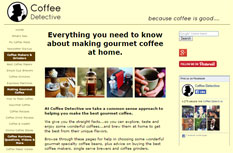 You probably remember this from your own time at school.
You probably remember this from your own time at school.
When you enjoyed the subject, and liked the teacher, you learned faster and did well. And the most enjoyable classes where those in which you were actually doing something rather than just studying a text book, line by line.
Long story short, you always learn more when you’re having fun. And what you learn sticks when you learn by “doing” instead of just reading text books.
The same is true when learning online writing and copywriting.
You can study all you want, but you’ll learn most when you “do it”, and when you’re having a good time.
Which brings me to my own favorite learning tool.

 Before it became commercial, the web was social.
Before it became commercial, the web was social. I’m a pain in the behind when I first start working with a new company.
I’m a pain in the behind when I first start working with a new company. You’re driving downtown, in three lanes of traffic, during rush hour on a Friday afternoon.
You’re driving downtown, in three lanes of traffic, during rush hour on a Friday afternoon. As an employee of a company, you’ll often turn up for work and then wait to be told what to do.
As an employee of a company, you’ll often turn up for work and then wait to be told what to do. High open rates are not the most important thing about email marketing.
High open rates are not the most important thing about email marketing.